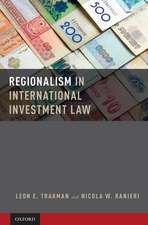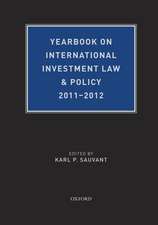Taxation and Development - A Comparative Study: Ius Comparatum - Global Studies in Comparative Law, cartea 21
Editat de Karen B. Brownen Limba Engleză Hardback – 23 ian 2017
| Toate formatele și edițiile | Preț | Express |
|---|---|---|
| Paperback (1) | 1003.70 lei 6-8 săpt. | |
| Springer International Publishing – 15 iul 2018 | 1003.70 lei 6-8 săpt. | |
| Hardback (1) | 1009.85 lei 6-8 săpt. | |
| Springer International Publishing – 23 ian 2017 | 1009.85 lei 6-8 săpt. |
Din seria Ius Comparatum - Global Studies in Comparative Law
- 18%
 Preț: 1584.40 lei
Preț: 1584.40 lei - 18%
 Preț: 1009.22 lei
Preț: 1009.22 lei - 18%
 Preț: 1573.51 lei
Preț: 1573.51 lei - 18%
 Preț: 1255.16 lei
Preț: 1255.16 lei - 24%
 Preț: 1515.12 lei
Preț: 1515.12 lei - 24%
 Preț: 802.76 lei
Preț: 802.76 lei - 15%
 Preț: 651.84 lei
Preț: 651.84 lei - 18%
 Preț: 958.56 lei
Preț: 958.56 lei - 24%
 Preț: 812.88 lei
Preț: 812.88 lei - 15%
 Preț: 653.33 lei
Preț: 653.33 lei - 15%
 Preț: 654.43 lei
Preț: 654.43 lei - 18%
 Preț: 1401.16 lei
Preț: 1401.16 lei - 18%
 Preț: 1007.80 lei
Preț: 1007.80 lei - 18%
 Preț: 898.89 lei
Preț: 898.89 lei - 18%
 Preț: 956.99 lei
Preț: 956.99 lei - 18%
 Preț: 789.98 lei
Preț: 789.98 lei - 15%
 Preț: 644.95 lei
Preț: 644.95 lei - 18%
 Preț: 953.97 lei
Preț: 953.97 lei - 18%
 Preț: 955.08 lei
Preț: 955.08 lei - 18%
 Preț: 2787.02 lei
Preț: 2787.02 lei - 18%
 Preț: 1010.03 lei
Preț: 1010.03 lei - 18%
 Preț: 1403.67 lei
Preț: 1403.67 lei - 18%
 Preț: 2114.90 lei
Preț: 2114.90 lei - 18%
 Preț: 2107.49 lei
Preț: 2107.49 lei - 18%
 Preț: 997.71 lei
Preț: 997.71 lei - 18%
 Preț: 955.40 lei
Preț: 955.40 lei
Preț: 1009.85 lei
Preț vechi: 1231.52 lei
-18% Nou
Puncte Express: 1515
Preț estimativ în valută:
193.30€ • 210.03$ • 162.47£
193.30€ • 210.03$ • 162.47£
Carte tipărită la comandă
Livrare economică 21 aprilie-05 mai
Preluare comenzi: 021 569.72.76
Specificații
ISBN-13: 9783319421551
ISBN-10: 3319421557
Pagini: 403
Ilustrații: XVI, 377 p. 4 illus.
Dimensiuni: 155 x 235 x 22 mm
Greutate: 0.73 kg
Ediția:1st ed. 2017
Editura: Springer International Publishing
Colecția Springer
Seria Ius Comparatum - Global Studies in Comparative Law
Locul publicării:Cham, Switzerland
ISBN-10: 3319421557
Pagini: 403
Ilustrații: XVI, 377 p. 4 illus.
Dimensiuni: 155 x 235 x 22 mm
Greutate: 0.73 kg
Ediția:1st ed. 2017
Editura: Springer International Publishing
Colecția Springer
Seria Ius Comparatum - Global Studies in Comparative Law
Locul publicării:Cham, Switzerland
Cuprins
Preface.- Introduction.- I. General Report.- Taxation and Development - Overview; Karen Brown.- II. National Reports.- Australia’s Hybrid International System: Limited Focus on Tax and Development; Miranda Stewart.- Recent Trends In Belgium’s International Tax Policy (In French); Edoardo Traversa and Gaëtan Zeyen - Translated to Englush by Karen B. Brown.- Income Taxation in Brazil – A Comparative Law Approach; Misabel Abreu Machado Derzi, André Mendes Moreira and Fernando Daniel de Moura Fonseca.- Taxation and Development In Croatia; Nataša Žunić Kovačević.- Tax Law Components to Provide Incentives for Investment; Michal Radvan and Dana Šramková.- Structural and Temporary Tax Mechanisms to Promote Economic Growth and Development in France; Thomas Dubut.- Transparency and Simplicity Support Investment in Hongkong; Andrew Halkyard.- Current Issues In Cross Border Taxation and Inbound Investments in The State Of Israel; Tamir Shanan, Sagit Leviner and Moran Harari.- How Italian Tax Policy Provides Incentives for Investment in Developing, Emerging, or Low-Income Countries; Claudio Sacchetto.- Taxation and Development: Japan; Yoshihiro Masui.- The Maldives – A Fledgling International Tax Jurisdiction; Kevin Holmes.- Extensive Treaty Network and Unilateral Credits Support Foreign Investment: The Dutch Approach; Raymon H.C. Luja.- Tax Incentives in the System of Direct Taxes in Poland; Wlodzimierz Nykiel and Michal Wilk.- Overview of Income and Investment Taxation in Portugal; Fernando Rocha Andrade.- Taxation and Development: The South African Position; Craig West and Jennifer Roeleveld.- International Taxation: The Case of Uganda; Jalia Kangave.- Britain Open for Business; Rita Cunha.- Taxation and Development: The U.S. Perspective; Tracy A. Kaye.- In Pursuit of A Modern Tax System to Accommodate Foreign Investment. Case Study: Venezuela; Serviliano Abache Carvajal.- III. Questionnaire.
Notă biografică
Karen B. Brown is the Donald Phillip Rothschild Research Professor of Law at the George Washington University Law School in Washington, D.C.
Textul de pe ultima copertă
This volume examines the tax systems of some twenty countries to determine whether their tax laws are used to support growth and development across borders in lower-income and poor countries. Given the critical economic development needs of poorer countries and the importance of stability in these regions to the security of populations throughout the world, the use of a country’s tax laws to support investment in the developing world gains crucial significance. This book explores whether international standards promoting the fundamental values of the major tax systems of the world accommodate incentives for these nations. In addition, it analyzes the way in which adoption of principles by higher income nations to protect their own revenue bases has a spill-over effect, impairing the ability of developing countries to sustain their economies. Following an introduction that synthesizes worldwide trends, the volume contains separate chapters for a variety of countries detailing the underlying goals and values of each system and the way in which the decision to employ (or not employ) incentives accommodates those ends. The chapters include reports for: Australia, Belgium, Brazil, Croatia, Czech Republic, France, Hong Kong, Israel, Italy, Japan, the Maldives, the Netherlands, Poland, Portugal, South Africa, Uganda, United Kingdom, United States, and Venezuela.
The volume memorializes the work of the General Reporter and National Reporters at the Taxation and Development session of the 19th Congress of the International Academy of Comparative Law held in July, 2014, in Vienna, Austria.
Caracteristici
First book to examine the effect of the fundamental values of the world's major tax systems in accommodating incentives for economic growth and development in low-income nations Provides easy comparisons of the use of tax incentives to encourage cross-border investment of the major tax regimes Examines the ways in which principles adopted by higher income nations to protect their revenue bases has the effect of impairing ability of developing countries to sustain their own economies ?













